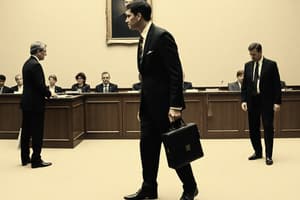Podcast
Questions and Answers
What is the courtroom work group?
What is the courtroom work group?
- Professionals by job and outsiders involved in the case (correct)
- A group of defendants
- A group of judges only
- Witnesses only
What is prosecutorial discretion?
What is prosecutorial discretion?
The decision-making power of prosecutors in handling criminal defendants.
What is exculpatory evidence?
What is exculpatory evidence?
Any information that clears a person of guilt or blame.
What is a subpoena?
What is a subpoena?
What are the rules of evidence?
What are the rules of evidence?
What defines an adversarial system?
What defines an adversarial system?
What is a peremptory challenge?
What is a peremptory challenge?
What are sequestered juries?
What are sequestered juries?
What is the harmless error rule?
What is the harmless error rule?
What is perjury?
What is perjury?
What is hearsay?
What is hearsay?
What is a hung jury?
What is a hung jury?
What is an Allen charge?
What is an Allen charge?
Participants in a criminal trial can be divided into what two categories?
Participants in a criminal trial can be divided into what two categories?
What is the judge's primary duty?
What is the judge's primary duty?
What is the burden of proof in a criminal trial?
What is the burden of proof in a criminal trial?
Who bears the burden of proof?
Who bears the burden of proof?
Which Supreme Court case requires the prosecution to disclose evidence related to a defendant's innocence or guilt?
Which Supreme Court case requires the prosecution to disclose evidence related to a defendant's innocence or guilt?
List three major categories of defense attorneys.
List three major categories of defense attorneys.
Which system is the primary method used to provide indigent counsel for criminal defendants?
Which system is the primary method used to provide indigent counsel for criminal defendants?
What is the primary purpose of a criminal trial?
What is the primary purpose of a criminal trial?
Describe the difference between factual guilt and legal guilt.
Describe the difference between factual guilt and legal guilt.
What are the eight general stages of a criminal trial in order?
What are the eight general stages of a criminal trial in order?
What is the fancy name for jury selection?
What is the fancy name for jury selection?
What are the three types of challenges to jury selection and how many do you have of each type?
What are the three types of challenges to jury selection and how many do you have of each type?
Which Supreme Court case recognizes a defendant's right to represent themselves and based on which amendment?
Which Supreme Court case recognizes a defendant's right to represent themselves and based on which amendment?
Describe the difference between an expert witness and a lay witness.
Describe the difference between an expert witness and a lay witness.
Is the defendant's presence required at every stage of the trial?
Is the defendant's presence required at every stage of the trial?
Flashcards are hidden until you start studying
Study Notes
Courtroom Concepts
- Courtroom Work Group consists of professionals and outsiders involved in a case.
- Prosecutorial Discretion allows prosecutors to make decisions on charges, case scheduling, and plea negotiations.
- Exculpatory Evidence serves to clear a person of guilt or blame.
- A Subpoena is a legal order compelling an individual to appear in court and provide testimony or evidence.
- Rules of Evidence dictate what can be admitted as evidence in court.
Trial Framework
- The Adversarial System features opposing advocates presenting evidence for the benefit of their clients with a neutral judge.
- Peremptory Challenge allows for the dismissal of a juror without needing to provide a reason.
- Sequestered Juries are isolated from public influence during a trial and deliberation.
- The Harmless Error Rule applies when an appellate court identifies an error but deems it not significant enough to warrant a reversal of the trial outcome.
Testimony and Jury Dynamics
- Perjury is the act of giving false testimony under oath.
- Hearsay refers to information not founded on a witness's personal knowledge.
- A Hung Jury is one that cannot reach a unanimous verdict.
- The Allen Charge instructs a deadlocked jury to reconsider the majority opinion to potentially reach consensus.
Roles in Criminal Trials
- Participants in a criminal trial are categorized as the State and the Defendant.
- The judge holds ultimate authority and has sentencing responsibilities, often requiring specific qualifications like passage of the bar exam.
Burden of Proof
- In a criminal trial, the Burden of Proof lies with the prosecution, which must prove the case beyond a reasonable doubt.
- The case U.S. vs. Bayley requires the prosecution to disclose any exculpatory evidence affecting the defendant's guilt or innocence.
Defense Attorney Categories
- Major categories of defense attorneys include Pro Se (self-represented), Private, and Court-appointed.
- The Adversarial System serves as the main method for providing legal counsel to indigent defendants.
Purpose of Criminal Trials
- The primary aim of a criminal trial is to assess witness testimony to prove a crime occurred beyond a reasonable doubt.
Guilt Distinctions
- Factual Guilt represents actual guilt based on facts, while Legal Guilt is established when guilt is proven beyond a reasonable doubt.
Stages of Criminal Trials
- Eight general stages of a criminal trial include:
- Trial Initiation
- Jury Selection
- Opening Statements
- Presentation of Evidence
- Closing Evidence
- Charging the Jury
- Jury Deliberation
- Verdict
Jury Selection Process
- The process of Jury Selection is known as Voir Dire.
- Types of challenges to jury selection include:
- Challenge to the array
- For-Cause
- Peremptory
- Specific numbers of challenges vary: Capital/Life cases allow 10, Felonies allow 6, and Misdemeanors allow 3.
Self-Representation Rights
- Farreta v. California recognizes a defendant's right to self-representation under the 6th Amendment.
Testimony Types
- Expert Witnesses possess specialized knowledge pertinent to the case and are recognized by the court, whereas La Witnesses include eyewitnesses and character witnesses without specialized expertise.
Defendant's Presence in Trial
- The defendant is required to be present at all significant stages of the trial, ensuring proper legal representation and rights monitoring.
Studying That Suits You
Use AI to generate personalized quizzes and flashcards to suit your learning preferences.




